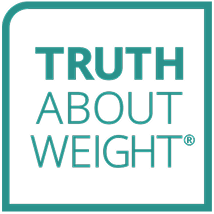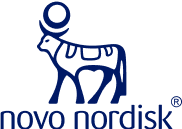
EXPLORE THE VIDEO LIBRARY
Donna and Reneé are paid Novo Nordisk
patient ambassadors.
The science behind weight loss and regain
Learn how changes in the body make it difficult to keep weight off over time.
Why is it so hard to keep the pounds off? Well, there’s more to weight management than meets the eye. People may see results when they limit calories, by reducing the size of meals, for example. And find ways to increase physical activity, like taking regular walks around the block. Science has shown the body responds in surprising ways when a person loses weight. It reacts to weight loss by trying to regain weight, making weight management a constant tug-of-war. Metabolism slows down and gets more efficient, requiring fewer calories to do its job. Hormonal signals can also change. The body increases a hunger hormone, called ghrelin, which tries to get you to eat more calories. And the hormones that tell the brain it’s time to stop eating, the “feeling full” signals, decrease. These are just some of the factors that make weight regain so common.
Following weight loss, the body’s metabolism slows down and appetite hormones change—making you feel more hungry and less full.
Hear from people like you
I am Anddy, and this is my truth about weight.
Early on in my life, every time I went to a doctor, I felt judged about my weight. Um, it was more about “You need to lose weight,” never an answer or a road map on how I needed to address my weight. And the first time...I...I met my doctor...The way that she addressed me and spoke to me, I felt like a human being. Where, with the other doctors, I felt like just another…chart.
You need to have somebody gonna celebrate your wins and is gonna hold your hands when you feel down; is not going to judge you. You need that person there with you. Someone that is gonna be able to tailor a plan that is gonna work for you. If someone is dealing with obesity, pick the right doctor for you.
Anddy shares her personal experience from working with health care professionals during her weight-management journey.
I'm Donna, and this is my truth about weight.
Weight is something that I’ve struggled with my whole life. I know people say that but I went on my first diet when I was 9 or 10 years old. I have gained and lost so many pounds. I just never was successful and I never felt that I could control my weight. And there were times when I gave up.
Learning that obesity is a disease was a revelation for me. It was such a huge relief for me that I didn't have to think about it as being my fault. And the fact that it was a multifactorial disease and had many different factors that contributed to it made it more understandable, to me, from a scientific point of view.
But I did realize that even though it's not my fault that I have obesity, it is my responsibility to manage it and I have the responsibility for continuing to find different options that will work for me because this is a lifelong disease.
For Donna, living with obesity has been a life-long journey. Today, she's sharing her perspective on weight management.
I'm Lisa, and this is my truth about weight.
Something that I want people to know is that it's not just about willpower, because I have willpower. Every time that I thought I was getting ahead and then I would slip back, not because I'm doing wrong I couldn't explain it. As I got older and start understanding the biology and the genetics, it wasn't my fault. This was not my fault.
When I learned that it was a science to what was going on with me, put me at another level, that I could be able to express it, and explain it to family members. It was a blessing that I can then spread the word.
Me, now being an advocate, and understanding, and being educated—the sky's the limit.
Lisa explains how learning the science behind weight allowed her to understand the disease and explain it to others.
I'm Maija, and this is my truth about weight. I’ve been living with obesity my whole life. When I had my first heart attack, you know, I didn't realize that obesity can lead to cardiovascular disease, you know, it can lead to heart attacks, it can lead to stroke. I didn't know that. And knowing that I have cardiovascular disease, I am living with obesity I need to know what my risk factors are and what I can do to live a healthy lifestyle. It's work, you know, it's—it's a relationship with yourself and your body. And I believe in really encouraging myself, you know, looking in the mirror and saying, you know, “You did good today. Good job.” I'm happy, I'm able to tell my story, and I want to stay on this ride and be here for it.
Maija tells how having a heart attack changed the way she approached weight and health.
I’m Reneé. This is my truth about weight. When I looked at the scale, it said 527. That’s when I realized, “Oh boy, what am I going to do?” I never realized that I weighed that much. The doctor, you know, looked at me, looked at my chart, he stated to me, “You have two choices: life or death. You need to pick one.” I know what life is. I want to live. When I found out that hormones played a role in weight gain and weight loss, it instantly clicked for me at that moment. It’s a disease, meaning it is not my fault. But there are tools that’s out there to help me no matter what it is. If it was eating less, if it was moving more—I just wanted to be healthy. I’m trying to choose life.
Reneé talks about when she first realized her weight was an issue and the tools she uses to stay on track with her weight and health.
Every day is a journey for someone who’s living with obesity. At my highest, I was 400 pounds, and I’m 4’11”! It really dawned on me that I had issues with my weight when I was around 13, 14 years old. I would hide in the closet to eat because I didn’t want people to see me eating. I tried not to eat a lot, but I still was gaining weight. People would ask me, “How do you fit in a chair?” or “How do you find clothes?” or “How do you go to bathroom?” And I just had to laugh with people. I started making jokes about myself because it was easier for me to do that. It took power away from people; that’s how I felt. I think there is not a diet out there that I have not done. Not knowing what to do to lose the weight was one of the hardest things. Culturally, in my family, when they put food on the table, you have to eat it all. If I don’t, then it’s an insult. My mom was overweight. My father, he had been overweight all his life. He had multiple medical conditions, and I saw how hard it was for him. My doctors kept saying, “Your family history is high blood pressure, you know, diabetes, heart condition. So, if you don’t watch what you eat and you continue to do this, you’re gonna have this.” I started getting sick as I got older. First, it was high blood pressure. Then it was the prediabetes. Then it was my, you know, my limbs, they’re hurting. I had issues walking because I would wobble. I would literally have to grab the banister and pull myself because I couldn’t go up the stairs. In 2022, my father had a heart attack, and he passed away. When we lost him, that’s when I said, “No, I have to make a change.” I decided that I really needed some medical help to do this, because all these years I was doing it on my own and it wasn’t working. I was fortunate that I found a doctor that was very good, very understanding, not judgy. Obesity is a medical condition that should be treated. This is something that will be with me forever, that I have to go and check on every day. Since losing weight, my high blood pressure has improved. My sugar has improved as well. I’m still concerned about heart disease. Whenever I go to the doctor, he’s like, “Your heart is good,” because, you know, I have that fear. In my weight-loss journey now, I never thought I would be here. I’ve reached a goal that I didn’t even think I was gonna reach. I think having the support of your family, you know, a good team of people working with you, I think that’s the key. But everyone’s body is different. Make sure you find the right plan for you.
With the support of her health care professional and family, Anddy is seeing weight-loss success and improvements in some of her weight-related health conditions.
I’ve always been active. I was a walker, I’d kickbox, always worked out. I started running in my late 20s, early 30s. I ran half marathons, women’s 10K. But I was about 270 pounds. For such a long time, I wasn’t able to make a significant reduction in my weight. My diet was not good. When it comes to food, you know, I didn’t know what moderation was. I had no idea. I knew that if I wanted it and I wanted to eat it, I was gonna have it. I was good at making accommodations for being overweight and kind of trying to hide that I was uncomfortable with being overweight. One thing that was a big challenge for me in my early 20s is traveling on small planes and having to ask for a seatbelt extender. I would always, you know, try to be very quiet about that and, you know, make sure nobody else heard me when I asked the flight attendant. I didn’t know how much living with obesity could lead to cardiovascular disease. In 2011, I had a heart attack at 34 years old. My son—he was about 7 months old. I was getting him ready for daycare, and all of a sudden, out of nowhere, I didn’t feel good. I started feeling nauseous. I couldn’t catch my breath. It was as if someone stepped on my chest at that moment, and I said, “I cannot breathe. Something’s wrong.” After I had the heart attack, I made so many changes in my life, in terms of my health and fitness and definitely in terms of my weight. I had lost over 150 pounds in 2020. But in 2021, I had a second heart attack. My health care professionals—they said had I been where I was, you know, 2 years before, I wouldn’t have made it. I realized obesity was a disease when I started working with a weight-management doctor. She actually said, “You know, you have a disease.” When she defined it for me in that way, it helped me to accept it. I felt like it wasn’t my fault. In our family, we are big foodies, but we’ve made a lot of changes. I always tell my son, “You eat until you’re satisfied. You don’t have to finish it all.” My husband’s very supportive as well, and has done a lot to change his diet and increase his own physical activity. I’ve had a lot of small victories since I’ve lost weight. Being able to cross my legs is something I’ve never been able to do when I was overweight, severely overweight. Being comfortable sitting in my seat on an airplane. I want people who are living with obesity to know that this is not about willpower. There are many different reasons why someone might be diagnosed with obesity. It’s okay to ask for help. There are tools and resources available for individuals living with obesity. Find out what works best for you.
After having a heart attack at 34, Maija learned about the connection between cardiovascular disease and obesity.



